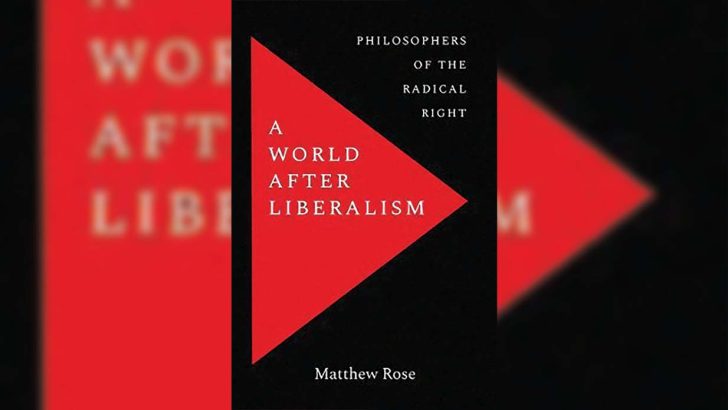A world after Liberalism: Philosophers of the Radical Right, by Matthew Rose (Yale University Press, £20.00/€25.00)
Frank Litton
Samuel Francis was a well-respected voice in conservative circles in the United States. He won several national awards for his column in the right-leaning Washington Times. Until, that is, 1995 when he went too far in his racist comments on slavery. He lost his column.
Now pushed to the outer margins of conservatism, his audience shrank to small groups and his writings were confined to newsletters with tiny circulations. He died in 2005 with his magnum opus, an eight-hundred-page study of United States politics and society, unpublished. Until, that is, 2016. Why was he now being taken seriously? The answer: Trump.
Francis had argued that the conservative Republican mainstream conceded far too much to the views of the dominant liberal elites. Politics was about power, and conservatives should cease arguing and find the power to unseat the elite.
There was, he pointed out, a sizeable constituency of middle and lower middle-class white citizens, those without college education, who worked in manufacturing. Neither Republicans nor Democrats spoke to their resentments as their incomes stagnated and fell and the values that bound them together in families and communities were disparaged.
Conservatives should give them voice with a nationalism strongly laced with racism. Trump mobilised this constituency. Those interested in understanding his success and decoding his message turned to Francis’s analysis.
Trump’s victory is not, of course, the only example of the weakening hold of the once rock-solid liberal democratic consensus. Populisms, on the left and right challenge it, and the success of the autocratic Chinese model that so quickly brought economic prosperity to so many, is seen as a viable alternative.
So Matthew Rose’s study of five thinkers on the radical right is timely. Rose guides us through the works of Oswald Spengler, Julius Evola, Francis Parker Yockey, Alain de Benoist and Samuel Francis.
He is an excellent guide to the different routes they take to the same conclusion. The liberal democratic order with its emphasis on the individuals and their autonomy ignores our equally important need to belong.
Their different versions of belonging have two things in common: they rely on the identification of an enemy as the focus of unity and they denounce Christianity whose universalism undermines the boundaries they would draw. As Trump’s prophet, Francis wrote “Christianity today is the enemy of the West and the race that created it”.
Time is running out for a liberalism tailored to the needs of a globalising capitalism that reduces citizens to consumers while governments hand over their job to technocrats. The centre disappears as radical left and right populisms take over the stage.
Catholics are suspicious of the radical left, with good reason given its traditional militant atheism. Perhaps it is for this reason that some look favourably on the radical right.
Further, its emphasis on belonging rather than autonomy chimes with Catholic social teaching [CST]. Rose’s study warns against this temptation.
As his lucid account instructs us, the analyses of the right attack tenets central to Catholic social teaching. They reject the universalism that sees us all equal in the sight of God, all promised salvation. They have no time for an ‘option for the poor’.
The Catholic tradition has its own understanding of how belonging can be balanced with autonomy, that is grounded in the Eucharist. It discourages us from turning our backs to the world, united by hatred and fear, to find security in a well-guarded enclave. Its global project is far richer than the impoverished globalisation that reduces all to economic calculation. A gift to the world, it is not a programme for a ‘power grab’. It is spelt out in Fratelli Tutti by another Francis.



